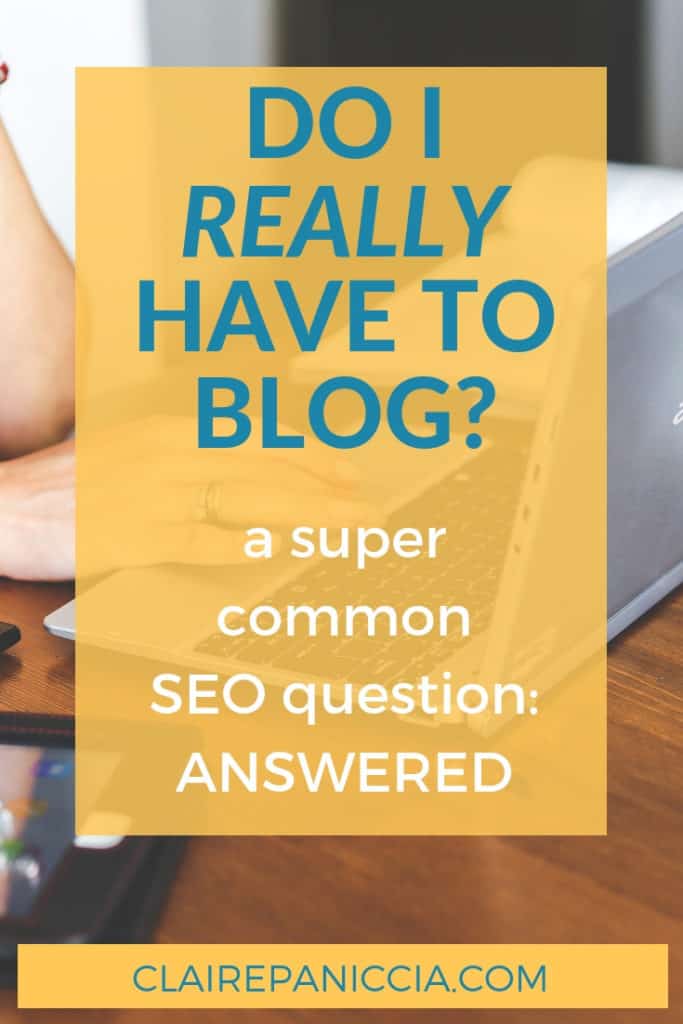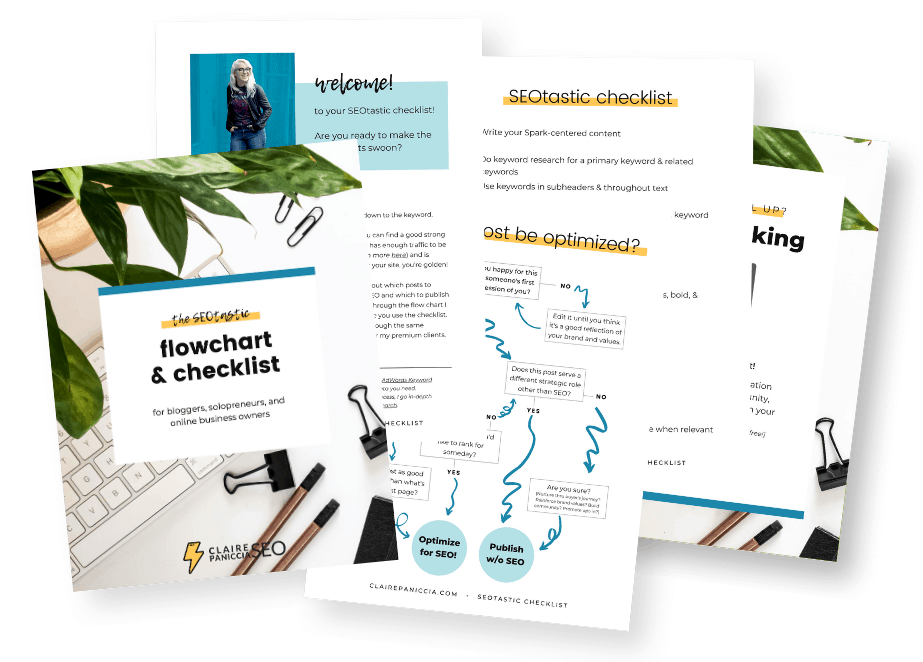
When I’m at a networking event or just in conversation out and about, and a fellow business owner finds out I do SEO, there are a few questions I get asked all the time.
One of those (if they already knew what SEO was before the conversation) that I get a lot is this:
“Do I have to blog? Like, really have to?? I just don’t have time!”
Obviously, if you’re a blogger, you have to blog (lol).
But usually this question comes from owners of other types of businesses, like service providers, online retail, manufacturers, and small local businesses.
In this post, I explain the truest possible answer I can give to this question.
[mailerlite_form form_id=4]If you're one of those business owners that's asked me this question, as much as I wish I could assuage your fear/frustration and assure you that you don’t have to blog, well… it’s not that cut and dry.
The truest answer I can give is yes/no. (And often, that’s exactly how I answer in conversation: “Yes slash no”)
To really break down what that means (and explore how to succeed at SEO without “blogging”), we have to start with what is meant by “blogging” in this question.
What exactly is blogging?
If you're asking this question, you may have some preconceptions about what it really means to blog:
- Some kind of diary about their business they have to write daily or weekly (hello, 2001 blogging!)
- Or writing and publishing a post once a week and then promoting it on social media every moment that week until their fingers fall off and their eyeballs turn square. (Basically, being a “blogger” on top of running your business)
Here’s the truth (and relief): Blogging for your business is neither of these things.
So then what is blogging (for your business)?
Well, for a blogger, yeah publishing regularly and consistently (usually once a week on the same day every week) is super important so that they can foster trust and familiarity with their readers and subscribers.
But blog-as-business is a completely different business model than what you have. For that kind of blog, SEO isn’t the be-all-end-all purpose of their content. It’s just one part of a multi-faceted strategy.
For a blog that’s supporting a business (and with SEO as its main purpose), consistent weekly publication isn’t 100% essential.
So in the sense of consistently writing content and publishing it every week, no, fellow business owner, you don’t have to blog.
But you do still have to publish content.
“Wait, whaaat, you just said I didn’t have to blog!!!”
Well, for SEO these days, “regularly updating your site” isn’t as big a part of the Google algorithm as it used to be.
A while back, you had to publish daily or weekly for even a chance to get seen in Google results (which is why you sometimes still see that advice floating around the interwebs)
But now?
Now it’s more important to have the content, and to make sure it’s all high-quality.
Sure, publishing that kind of content regularly will give your site more pages and more chances to target keywords, so in that sense it helps to play the numbers. But it is possible to have SEO success for your business without it.
So instead of bending over backwards trying to squeeze time into your business schedule to publish fluffy, thin posts on your business’s “blog”, you’re better off occasionally publishing high-quality, in-depth, evergreen content every once in a while, and then making sure it all stays up to date.
It may still be called a “blog” on your business’s site, but it’s really more of a collection of articles and resources.
Hence the weird “yes slash no” answer

What Your SEO Content Needs to Do
If the main goal of your site’s “blog” is to establish and strengthen SEO and bring in traffic from Google, your content needs to do two things:
- Rank for relevant, high-volume keywords that your target customer is searching in Google (and actually get them to click your site over another result on the page)
- Attract backlinks from high-authority sites in relevant industries (whether your industry or something related)
These are the two elements of SEO that content is a critical part of (and are confirmed by Google as the two most important ranking factors in SEO).
So what does this type of content actually look like?
A (Hypothetical) Example of Strong SEO Content for Business
Let’s say there’s a business that sells culinary equipment online.
A great piece of SEO content for them could be something like “37 Different Types of Flour and What To Use Them For”
Why?
People searching for “different types of flour” or similar terms are most likely going to be baking enthusiasts like my dad (below) who would be thrilled to spend $700 on a killer mixer or a high-end flour mill or something.
Also, this is a massive topic you could go super in depth on, with loads of details and facts and nutritional information and links to recipes. This makes it extremely linkable.
Sites that publish content about food or cooking (like food blogs, or baking magazine sites, or a cooking school’s site, or a vegan blog, etc) would love to link to this article.
Why?
Well, because it’s so damn high-quality!
It’s a topic their audience would be interested in, and it adds value to the page they added the link to (maybe their post on substituting whole wheat flour for white flour?), all of which makes them look good. Plus, it’s a boat load of research and writing they didn’t have to do, but can still provide that value to their readers.
Splitting the SEO Purposes
Now that you’ve got a good idea of what a piece of SEOtastic content for your business could look like, let’s go back to the idea of your business’s content needs to do two things (rank for keywords and attract backlinks). I’m gonna throw another wrench in there and blow your mind.
Each piece of content doesn’t have to do both.

In an ideal world, sure, it’d be awesome if everything you published could rake in the backlinks, bring in boatloads of traffic from Google, and also be super shareable on social media while simultaneously converting sales (not to mention all the other things content marketing can do).
But hey, not every piece of content can be Supercontent.
It’d even be great if every piece of content could attract backlinks and rank for keywords too!
And that does happen plenty.
But depending on your industry or business model, it may be a good strategy to split up the goals.
Publish some content specifically designed to attract backlinks, and publish some other content that’s specifically designed to rank for important keywords your target customer would search.
This is usually a good strategy if the sites you’d like backlinks from aren’t necessarily going to be interested in the same types of content your target customer is interested in. This case study on YesOptimist offers a great illustration of this strategy.
So to answer the question in one sentence:
All this is to say that, basically: No, you don’t have to blog, but you do need content.
How much content is needed for SEO?
You may be thinking “Okay, awesome, I don’t need to blog every week. I can get down with that. How often do I need to publish content?”
Unfortunately, there’s no straight answer to that question.
(This is a common theme in SEO *shrug*)
How much content your site should have in order to bring in a profitable amount of traffic depends on a lot of different things. A few things to consider are:
- The size of your business (and therefore what “profitable amount” means)
- Your industry and its relative SEO-competitiveness (marketing is a lot more competitive than, say, cat care)
- The size of your market (local businesses might not need as much content as a business targeting the whole internet)
- Your site’s current SEO profile (are you already doing well on Google and you want to do better? Or did you literally just go live?)
- And so much more…
You can figure out how much and what kind of content your site might need for SEO by researching the sites of your competitors and others in your industry.
To start off, look at their existing content, what keywords they’re ranking for, how many backlinks they have, and the tech on their site.
Once you’ve done some keyword research, you can also look to see what sites and pages are at the top of the search results for each keyword and if you’re able to compete with them (and if so, how).
No matter what, bringing in traffic from Google with good SEO takes content as part of the puzzle.
You may only need one piece of in-depth evergreen content, you may need a whole strategy.
Regardless, you still gotta have it. There’s no magic wand or tool or trick that will make it rain traffic on your site all of a sudden.
If you're all about that DIY, here are some resources to help you create SEOtastic content for your site:
[wc_box color=”inverse” text_align=”left”]
The Ultimate Guide To Writing For SEO: Everything You Need To Know
Keyword Density: What It Is, Why It's Useless, And What to Focus On Instead
SEO For Blogs: 9 Simple Things You Need TO Do To Every Post
[/wc_box]
Free SEOtastic Flowchart & Checklist



This is really awesome!!! Keep it Up.